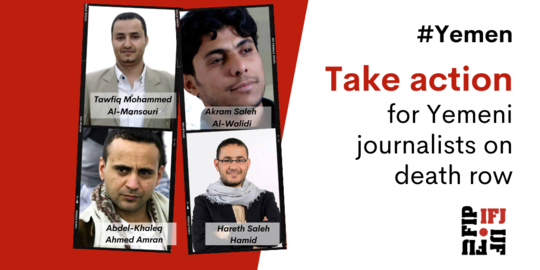World journalists’ community urges you to stand up for journalists in Yemen
Abdulakhleq Amran was born in 1983, he’s married with two children. Having graduated in Journalism from the University of Sanaa, he works for Al-Islah Online website. He was arrested in Bahr al-Ahlam Hotel in Sana'a while there using the internet and electricity for his reporting. Since then, he had been held in extremely harsh conditions in prison, where he had suffered torture which left him with a pain in his spine and a kidney problem.
Akram Al-Waleedi was born in 1985. He graduated from the College of Communication and worked for Alrabie-ye.net news website and the Yemen News Agency SABA. Detained in bad and harsh conditions, he was also subjected to torture in prison, where his health has seriously deteriorated. His family told the IFJ that he suffers from back and colon pain, besides a very delicate psychological situation.
Hareth Humaid was born in 1990, graduated from high school and was working as a reporter for Alrabie-ye.net news website, which is currently suspended. As with his colleagues, he was been held in prison since his arrest in bad and harsh conditions and has been tortured.
Tawifq Al-Mansoori was born in 1986. He studied journalism and worked forAl-Masdar newspaper. He has been held in harsh conditions since his detention and has also been subjected to torture in prison and suffers from poor health. His family told the IFJ that he has asthma, shortness of breath, rheumatism of the heart, diabetes and prostate problems.
They were arrested for reporting on human rights violations committed by Houthi forces. Now they could lose their life for fulfilling their professional duties and informing the world about the cruelty of the Yemeni war.
Help us to draw the international community’s attention to this case by signing our open letter

